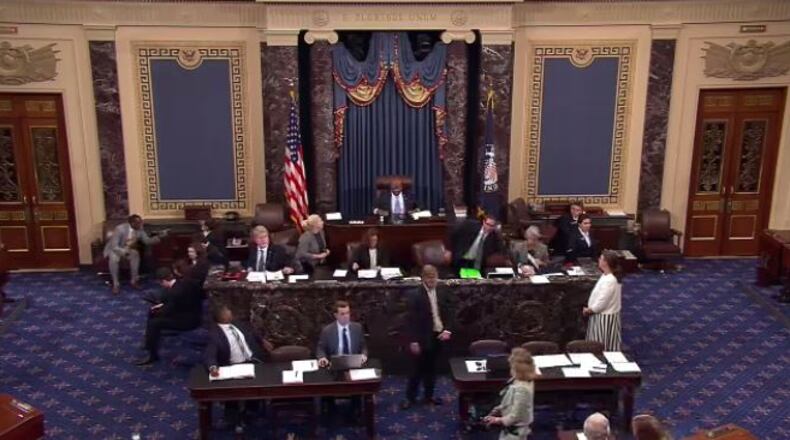With the clock ticking down on a special expedited legislative procedure that avoids a Senate filibuster, Republicans are trying to rally support for a new plan that's designed to make major changes in the Obama health law, in hopes of mustering 50 votes for the bill before the end of September.
"Doing nothing is not an option," says Sen. Bill Cassidy (R-LA), one of prime movers - with Sen. Lindsey Graham (R-SC) - behind a bill that was unveiled just last week, but has picked up support from most Republicans in the Senate.
"We are giving the power over health care to the states, not DC," Cassidy said, labeling his plan a "fundamentally different approach to health care than Obamacare."
So far, the White House has not put a full court press on behind the legislation, as this week, President Trump will be focused mainly on the gathering of the United Nations General Assembly in New York.
"As I have continued to say, inaction is not an option," the President stated in a written statement issued last week.
"I sincerely hope that Senators Graham and Cassidy have found a way to address the Obamacare crisis," Mr. Trump added.
The same few Senators who resisted earlier GOP health care bills are again in the spotlight, as Republicans can't afford to lose more than two of their 52 Senators.
Already, one has made clear, he is not on board with the new Graham-Cassidy plan.
"I can't support a bill that keeps 90 percent of Obamacare in place," said Sen. Rand Paul (R-KY), who argues that the Graham-Cassidy plan "is not repeal or replace, it is more Obamacare Lite."
Other GOP Senators on the fence about this plan include Sen. Susan Collins (R-ME), and Sen. Lisa Murkowski (R-AK) - both of them joined with Sen. John McCain (R-AZ) to torpedo the GOP 'skinny' health care bill earlier this summer, when McCain dramatically voted against in a session that ran past midnight.
Like other GOP plans, Graham-Cassidy does not 'repeal and replace' the Obama health law, as much of the underlying architecture is left in place by the bill.
The plan would zero out the penalties under the individual and employer mandates, phase out a few of the taxes enacted under the Obama health law, and most importantly - it block grants money to the states, and allows them to figure out the best way to help individuals get health insurance.
"States would have significant latitude over how the dollars are used to best take care of the unique health care needs of the patients in each state," backers say.
Democrats started to mobilize their opposition over the weekend, worried that Republicans just might be able to thread the needle and get something done before September 30, when authorization under "budget reconciliation" runs out.
"This week we need to be focused on defeating the Graham-Cassidy bill. It would end the Affordable Care Act," said Sen. Kamala Harris (D-CA).
"They won't stop until the end of September," said Sen. Brian Schatz (D-HI). "We cannot stop until the end of September."
Democrats on Monday asked the Congressional Budget Office to quickly weigh in on the new GOP plan.
Credit: Jamie Dupree
Credit: Jamie Dupree
The health care reconciliation bill remains on the Senate calendar; Senate Majority Leader Mitch McConnell could force a vote at anytime to re-start debate on health care, and bring up the Graham-Cassidy bill.
If the Senate were to approve the plan, it's thought that the House could still vote on it after September 30 - but no changes would be allowed to the bill.
About the Author



